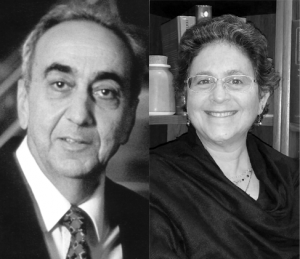
GUMC professors Liza H. Gold and Robert I. Simon analyze gun violence and mental illness in their new book.
Georgetown University School of Medicine clinical professors of psychiatry Liza H. Gold and Robert I. Simon argued that links between mass gun violence and mental health are exaggerated in their book Gun Violence and Mental Illness, which will available for sale in December.
Gold said she was inspired to begin research for the book after the 2012 mass shooting at Sandy Hook Elementary School in Newtown, Conn. The shooter, Adam Lanza, had been diagnosed with Asperger’s syndrome.
“I just decided that I needed to educate myself about what was going on with this,” Gold said. “The more I learned, the more I felt that if I, as a regularly well-educated professional psychiatrist, didn’t know some of this data, then how likely was it that many other people didn’t know either? And so was born the idea for the book.”
In her research, Gold found that of the roughly 33 thousand deaths from guns per year, two thirds are firearm suicides, with most of the rest resulting from interpersonal violence. Mass shootings account for less than 1 percent of gun related deaths, peaking at 0.53 percent in 2012, the year of the shootings in Aurora, CO. and Newtown, CT.
According to Gold, when people with mental illness have access to firearms, they are much more likely to commit suicide than to harm anyone else.
“It’s hard to talk about mental illness without raising all these negative stereotypes associated with it,” Gold said. “The reality is that most people with serious mental illness are not violent. … The incidence of a person with mental illness committing gun violence against a stranger is one of the rarest forms of gun violence in the country.”
Gold argued that the policy response should be refocused from broad gun control legislation to firearm regulation based on recognized categories of risk identified through research.
“I don’t think people should be talking more about gun control policy. Gun control is a dead issue,” Gold said. “I think we need to be talking about sensible firearm regulation and raise the standards for people to whom we are willing to sell firearms to make them more accountable.”
Gold advocated temporarily separating someone at risk of harming themselves or others from his weapon. She cited California’s 2014 Gun Violence Restraining Order, which enables people to petition for law enforcement to take an individual’s firearm if they believe that the person is at risk of committing violence.
“Many people will voluntarily give up their firearms to family members or friends,” Gold said. “It doesn’t mean they have to sell them or get rid of them, but when the person is in crisis, for however long that may be, if they care about their loved one, they shouldn’t have access to firearms.”
Georgetown Against Gun Violence President Emma Iannini (SFS ’16) said that people often turn to mental health issues as the easiest problem to address after the tragedy of a mass shooting.
“There’s this false narrative in the media that people who are prone to mental health crises are more likely to engage in gun violence, either against themselves or others, and that’s really a huge fallacy that unfortunately underpins a lot of the public policy suggestions that elected officials have put forward at the congressional level,” Iannini said. “After Newtown, we saw a lot of focus on what can done on the mental health issue, because that’s the least controversial facet of the problem that impacts gun violence.”
Iannini agreed with the book’s emphasis on firearm regulation, but said there is a need to establish a mental health database that limits the quantity of guns and ammunition an individual can purchase within a given timeframe, based on his status in the database.
“The deadliest incidences of massacre shootings are where you have casualties or injuries of over half a dozen people. A lot of times that level of violence is able to be done because people have purchased multiple rounds of ammunition and have multiple weapons on them,” Iannini said. “I would say that quantity restriction has, at least in my personal opinion, some merit to it.”
Michael Khan (COL ’18), a writer for “The Right Way,” the Georgetown College Republicans’ blog, agreed with Gold’s advocacy of action other than gun control. [Disclaimer: Khan is also a columnist for The Hoya.]
“These mass shootings, as horrific as they are, really won’t be solved by any more gun control,” Khan said. “Most gun crime is committed with handguns. There’s no gun control that could solve any of those problems. Their findings seem to work against it.”
Correction: An earlier version of this article indicated that Gold and Simon were psychology professors. They are clinical professors of psychiatry. Gold has also requested corrections to quotes spoken in error for the sake of accuracy. This includes previous statements linking mental illness with suicide as well as firearm policy based on categories of risk.





















Ron Suran • May 22, 2016 at 12:02 pm
I have been working with mental health individuals for the past 7 years at an agency in Nebraska. The consumers talked about the violence issue in groups. They are concerned about the stigma that is associated with violence and MH. The observation that they will harm themselves not others when they have a weapon seems to be true. Several suicides but no harm to others. I have been reading a book about Columbine written by one of the shooters mothers and they Von Mour shooting. Depression was a common thread among the shooters in both situations.